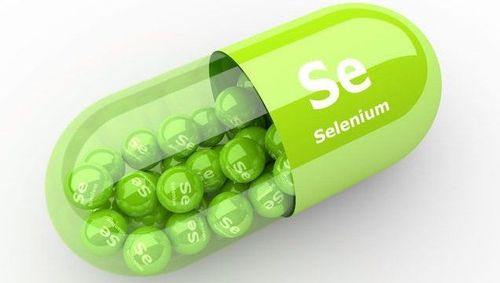This is an automatically translated article.
The immune system is a protective barrier for healthy growth. In order to strengthen the immune system, in addition to providing adequate protein and vitamins for the body, it is important to supplement with micronutrients. In which, immunity-boosting selenium is an indispensable micronutrient. Children lacking selenium will be immunocompromised, susceptible to goiter and heart disease.
1. What is selenium?
Selenium (Selenium) is a very necessary micronutrient for the body, especially in children. Selenium is a structural component of more than 20 selenoproteins, which play an important role in DNA synthesis, thyroid hormone metabolism, and reproduction. In particular, selenium increases immunity and protects the body from infectious agents, avoiding damage caused by oxidation.
Recommendations on selenium requirements for children:
For children under 6 months old: Selenium requirement is 6 mcg/day. For children 7-12 months old: Selenium requirement is 10 mcg/day. For children 1 - 3 years old: Selenium requirement is 17 mcg/day For children 4 - 9 years old: Selenium requirement is about 20 mcg/day day and 32 mcg/day in men.
2. Role of Selenium in Children
Although selenium is known as a golden micronutrient for children's immune system, selenium deficiency in children is little attention. Therefore, it is important to know the role of selenium in the body.Role in the immune system Selenium is a structural component of more than 20 different Selenoproteins. In particular, Selenium plays an indispensable role in the enzyme Glutathione Peroxidase (GPx) - one of the most important antioxidant enzymes. Therefore, selenium affects every component of the immune system, especially the formation, development and functioning of white blood cells. Selenium helps protect immune cells such as neutrophils, lymphocytes, and macrophages. In addition, selenium activates several other enzymes in the immune system, restores genetic structure, and detoxifies heavy metals.
Selenium participates in the structure of antibodies - called immunoglobulins (IgA, IgM, IgG) - that help the body destroy pathogens.
Children lacking selenium will have impaired immune function, reduced white blood cell and thymus function, so their resistance to infection is very poor. This leads to children being susceptible to infections, especially respiratory infections such as pharyngitis, otitis media, bronchitis, pneumonia,... and intestinal infections.

Selen tăng miễn dịch và duy trì thể trạng khỏe mạnh ở trẻ
Role for the development of children Selenium is involved in the formation of the enzyme iodothyronine deiodinase needed for iodine metabolism and thyroid hormone synthesis. Thyroid hormone plays a very important role in energy metabolism, necessary for the body's growth and development, both physically and intellectually. Severe selenium deficiency in children has also been linked to Keshan disease - a disease that causes severe myocardial damage due to myocardial necrosis.
3. How to supplement selenium for children to effectively increase resistance
Children are in the developmental stage, so they need to provide a full range of nutrients, essential vitamins and minerals. Although selenium boosts immunity and is essential for development, the body cannot synthesize it, but needs to be supplemented from outside through food and supplements in the form of nuggets or syrup.
Foods containing a lot of Selenium such as:
In animals: Selenium content is abundant in fish, shrimp, crab, beef, pork... Especially, fish skin, fish liver and seafood are rich in selenium the most. (20.8 - 40.5 mcg/100 grams). Marine and freshwater fish have similar levels of selenium. Followed by egg yolks and poultry. In plants: Selenium is found in beans, cereals, spinach, broccoli, cabbage, mushrooms, garlic, apples, etc. In particular, germinated green beans are rich in easily absorbed selenium. Breast milk, cow's milk Supplements in the form of nuggets or syrups containing synthetic selenium will provide the child with the required amount of selenium. However, before using for children, parents should consult a doctor. Selenium deficiency can cause dangerous complications in children's health and well-being, so parents need to observe and timely supplement this important source of this vitamin.
In addition to dietary supplements, parents can give their children supportive foods containing selenium and essential micro-minerals such as zinc, lysine, chromium, selenium, ... to help fully meet their needs. nutritional requirements in children. At the same time, these essential vitamins also support digestion, enhance nutrient absorption, help improve anorexia, and help children eat well.
Please regularly visit Vinmec.com website and update useful information to take care of your baby and family.













